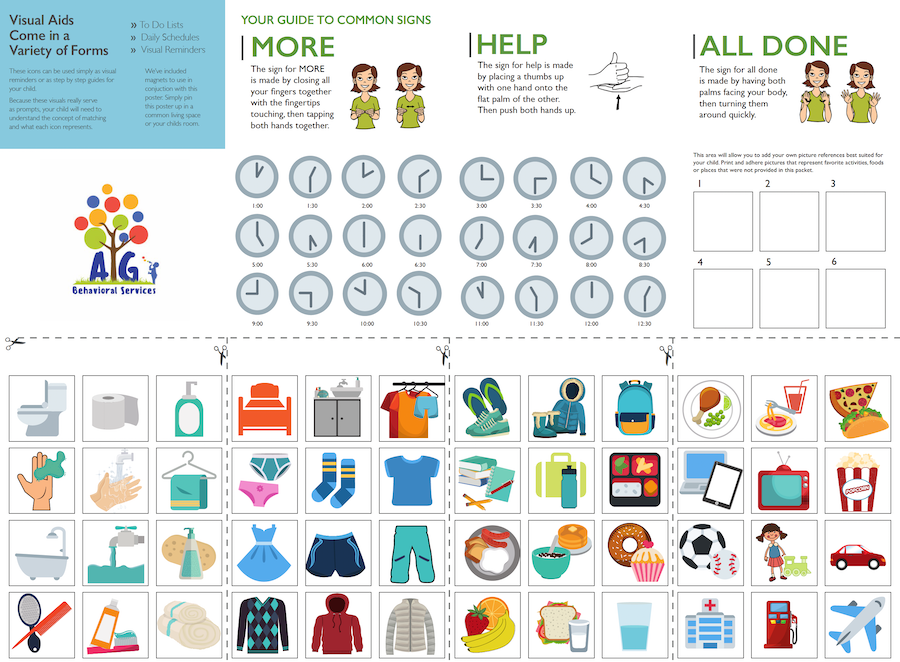In our fast-paced lives, staying organized can often feel like an uphill battle. Many of us turn to reminders, schedules, and calendars to manage our daily tasks, providing a clear roadmap of what to expect throughout the day. This sense of predictability not only helps us stay on track but also eases our minds as we navigate our busy lives. Similarly, children with autism greatly benefit from the structure and clarity that visual schedules offer. These schedules can be tailored to each child’s unique needs, helping them understand and anticipate daily activities in a way that feels manageable and predictable.
Understanding Visual Schedules
Visual schedules are tools that outline the sequence of events or tasks in a visual format. They can take various forms, from picture-based schedules to written checklists or even virtual calendars. The beauty of visual schedules lies in their flexibility—they can be customized to suit the individual preferences and abilities of each child, making them an incredibly versatile support tool.
Recent Posts
- Latest Autism Research and News Highlights
- Historic $50 Million Gift Spurs Launch of the Lurie Autism Institute at CHOP and Penn Medicine
- Daily Mindfulness Practice Reduces Anxiety for Autistic Adults
- Navigating Autism in New Jersey: Challenges for Parents Raising Children on the Spectrum
- Preparing for Summer Transitions with ABA: Strategies to Maintain Progress
Types of Visual Schedules
1. Picture Schedule: Uses images or symbols to represent different activities or tasks. This is particularly useful for younger children or those who are non-verbal.
2. Written Checklist: For children who can read, a written list of tasks can provide a clear and direct guide to what needs to be done.
3. Virtual Calendar: Digital tools, such as apps or calendar software, can be used for children who are comfortable with technology, offering a modern approach to schedule management.
The Benefits of Visual Schedules
Implementing a visual schedule in your child’s daily routine can yield numerous benefits, many of which extend beyond just keeping them on task. Here’s how visual schedules can support your child:
– Builds Routine: By consistently following a schedule, children develop a sense of routine, which can be incredibly comforting and stabilizing, especially in the often unpredictable world they navigate.
– Increases Predictability: Knowing what comes next reduces anxiety and stress, making transitions between activities smoother and less challenging.
– Versatile Across Environments: Whether at home, in the community, or at school, visual schedules provide a consistent framework that can be applied in various settings, ensuring your child feels secure wherever they are.
– Improves Transition Skills: Moving from one task to another can be difficult for children with autism. Visual schedules help break down these transitions into manageable steps, reducing resistance and increasing cooperation.
– Promotes Independence: As your child becomes more familiar with their schedule, they’ll start to take ownership of their tasks, fostering a sense of independence and self-reliance.
– Facilitates Skill Acquisition: Visual schedules can be used to teach new skills by breaking them down into simple, understandable steps, making it easier for your child to grasp and master them.
Routine and Structure: Why They Matter
Many daily routines follow the same steps every day. For example, a morning routine and nighttime routine often consist of the same activities—getting dressed, taking a shower, brushing teeth, and so on. For children with Autism Spectrum Disorder (ASD), this consistency is not just helpful; it’s crucial. Children with ASD tend to prefer structure and routine, as it provides them with a sense of security and predictability in their world.
When teaching specific tasks, using a visual step-by-step guide can significantly enhance a child’s ability to perform these tasks independently. This approach not only boosts their confidence but also helps reduce problem behaviors that might arise from confusion or frustration. By clearly laying out what is expected, a visual schedule minimizes uncertainty, which is often a trigger for stress and anxiety in children with ASD.
Practical Uses for Visual Schedules
Visual schedules are incredibly versatile and can be adapted for various aspects of your child’s life. Here are some practical ways you can implement them:
– Bedtime Routines: Outline each step, from brushing teeth to reading a bedtime story, to help your child wind down and prepare for sleep.
– After-School Routines: Help your child transition from school to home by clearly defining tasks like homework, snack time, and play.
– Morning Routines: Start the day smoothly with a visual guide to getting dressed, eating breakfast, and preparing for the day ahead.
– Community Outings: Use schedules to prepare your child for visits to places like the grocery store, doctor’s office, or social gatherings, reducing anxiety by setting clear expectations.
– Daily Living Tasks: Break down multi-step tasks like brushing teeth, dressing, or preparing a simple meal to encourage independence and confidence.
– Skill Development: Whether it’s learning to tie shoes or follow a recipe, visual schedules can be used to teach and reinforce new skills in a step-by-step manner.
The Role of Reinforcement
Incorporating positive reinforcement into the use of visual schedules is key to their success. By offering a motivating reward—whether it’s a favorite activity, a small treat, or simply praise—your child will be more likely to engage with the schedule willingly and develop positive associations with completing tasks.
Preparing for the New School Year
As the new school year approaches, routines inevitably shift, and it’s an excellent time to consider whether a visual schedule might benefit your child. Collaborate with your Clinical Team to assess your child’s needs and determine the most effective way to implement this support. A well-crafted visual schedule can make the transition into the new school year smoother, setting your child up for success both at home and in the classroom.
By embracing visual schedules, you’re not only helping your child manage their day-to-day tasks but also empowering them to navigate the world with greater confidence and independence.
AGBS provides ongoing care for children, adolescents, and young adults with autism to improve the quality of their lives. If you would like learn more about how AGBS can help please contact us here , or call 908-913-0443.




